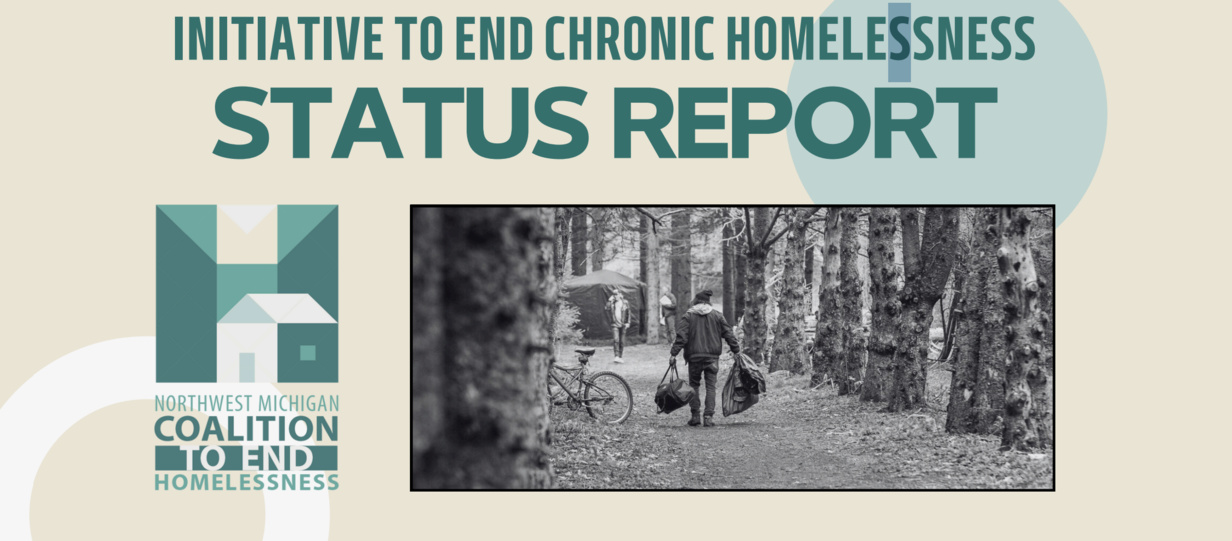
$1M Funding Request to Address Homelessness, Neighborhood Association Council on City Agenda
By Beth Milligan | June 9, 2025
Traverse City commissioners will consider a $1 million request to create a dedicated fund for addressing homelessness – particularly to bolster permanent supportive housing – and a proposal to create a president’s council featuring the leaders of all city neighborhood associations at their 7pm study session tonight (Monday).
Homelessness Funding Request
The Northwest Michigan Coalition to End Homelessness will appear before commissioners tonight with a request to include a $1 million line item in the city’s 2025-26 budget for a dedicated fund that would support “priorities and emerging needs related to permanent supportive housing,” according to a letter from Director Ashley Halladay-Schmandt.
The Coalition is leading a Housing and Homelessness Task Force – which also includes representatives from the city and Grand Traverse County and is backed by a Rotary Charities grant – “designed to create a long-term, effective, and coordinated response to homelessness,” according to the organization. The task force is meeting May through September, “during which time specialized work groups will assess gaps in current systems, identify effective strategies from other communities, and develop an actionable plan tailored to the unique needs of Northwest Michigan,” according to the Coalition.
Work groups will focus on areas including safety net services, emergency shelter and services, and housing solutions. The task force, which will also give an update on its progress to Grand Traverse County commissioners Wednesday, will unveil its community action plan by the end of the year with funding recommendations for prevention strategies, shelter, day services, housing, and supportive services. The $1 million ask to Traverse City would create a permanent supportive housing response fund that would allow the city “to act urgently” while implementing that plan, according to the Coalition.
Proposed uses for the fund include gap financing for permanent supportive housing development, incentives for landlords and property owners to participate in permanent supportive housing, converting under-utilized properties, securing affordable units, and filling support service gaps. The city adopted a resolution in December to support the Coalition’s goal to end chronic homelessness by 2028. Halladay-Schmandt said the funding commitment would be “in alignment” with that resolution and is “essential to addressing urgent gaps as they arise.”
“This $1 million investment is not only a crucial piece of the long-term strategy to end chronic homelessness – it is also a powerful signal of the city’s leadership and commitment to public-private collaboration, systems change, and a housing-first approach,” she wrote. “It will position Traverse City to leverage additional state and federal funding, while ensuring locally informed, data-driven solutions are implemented with speed and accountability.” Over 100 people experiencing chronic homelessness have been housed in the last two years, but a lack of “deeply affordable housing in the community” continues to create extremely low vacancy rates that push more people into chronic homelessness, the presentation states.
Commissioners Jackie Anderson and Mi Stanley requested commission consideration of the funding request, which will be up for discussion only tonight because of the study session (any allocations would occur at a future regular meeting of the board). City commissioners just approved their 2025-26 budget last week, but could amend it at any time – and have expressed interest in better aligning it with the city’s new strategic plan, which among other action steps calls for using a regional collaborative approach to address the housing crisis. City Manager Liz Vogel says commissioners and staff would need to talk through the legal structure of such a funding allocation and possible funding sources. The city has been working to draw down its fund balance, which is one option; the general fund or opioid settlement dollars could be other options.
“I know there’s commissioner interest, so how do we actually do it?” Vogel says. “I’m going into the meeting with a healthy sense of curiosity and open-mindedness about what’s possible.”
Neighborhood Associations
The addition in recent years of several new neighborhood associations – citizen groups representing different geographic areas of the city – is prompting officials to consider creating a president’s council featuring the top officers from all associations across the community.
There are now 12 neighborhood associations in Traverse City: Base of Old Mission Peninsula, Indian Woods, Triangle, Oak Park, Traverse Heights, Boardman, Midtown Center Condominium, Old Towne, Central, Slabtown, Kids Creek Commons, and Morgan Farms. Discussions are also underway to “potentially form two additional associations on the southwest and southeast areas of the city limits,” according to Interim Assistant City Manager Deb Allen.
While all city residents are encouraged to weigh in on city issues, those who “share a common neighborhood identity, goals, and concerns may elect to form a neighborhood association,” according to the city’s website. City Clerk Benjamin Marentette previously pointed out the benefits of such groups – such as helping neighbors feel connected and being able to “collectively voice concerns or feedback to the city” – but also noted that the “bandwidth of city staff and ability to be effective in serving multiple neighborhood associations is not infinite.”
The creation of a president’s council could help address that staffing capacity issue. Rather than having a staff liaison assigned to each neighborhood association, staff would attend meetings as needed – with more formal support coming from the president’s council. The council would contain the presidents and vice presidents of each association who would meet to “facilitate collaboration, share information and updates, and gather input on the city’s strategic planning process,” according to Allen.
Allen said she met with the leadership and members of five city neighborhood associations over the last 10 months to share the concept, which was “met with positive reviews” and “great interest.” The president’s council is proposed to meet three times a year – in March, June, and October – “to best accommodate inclement weather, transient residents, city fiscal year planning/reporting, and city commission elections,” Allen wrote to commissioners. After discussing the proposal tonight, commissioners will be asked to vote at their June 16 meeting to update the city’s resolution recognizing neighborhood associations to include language about convening the president’s council.
Comment






